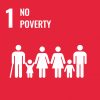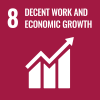Omoa, Honduras – Martha, a young mother of three from Omoa in northern Honduras, dreams of a better life for her children.
At only 22 years old, she struggles to make ends meet as job opportunities in her region are limited. Her husband, Jery, obtained residency in the United States and regularly sends money home to provide for their family.
Like many Hondurans, Jery made the difficult decision to leave home in search of work opportunities abroad.
According to the National Survey on Migration and Remittances in Honduras (NSMR), developed by the International Organization for Migration (IOM) and the National Institute of Statistics of Honduras (INE), there are approximately 580,000 migrants from Honduras who now live outside the country. Among the main reasons for migrating outside Honduras, the Honduran government’s Migrant Assistance Registry Information System (SIAMIR) indicates that at least 77 per cent of people migrated for economic reasons, 14 per cent for family reunification and 4 per cent for safety.

Remittances are a fundamental support for Martha and her husband, allowing them to cover their basic needs and pay for their children's education. Photo: IOM 2023/Sonia Lagos
For Martha, remittances are an important source of income every month; they allow her to cover basic household needs such as food, clothing, health care, and paying for her eldest daughter's university education.
“For many Honduran families, like mine, remittances are an economic support for the household,” she says. “[My husband's] support has been unconditional, and without it, we would not be accomplishing our goals.”
Remittances are among the main sources of household income in Honduras, reaching USD 8.8 billion in 2023, comprising 26 per cent of the country's Gross Domestic Product. One out of every four households receives remittances on a regular basis, used primarily for food (78%), health (31%), and utility (30%) expenses, according to the NSMR survey. In 2022, the average surveyed household received 56,000 lempiras (approximately USD 2,200) per year.

After having traveled and worked abroad, Adelmo was able to support his family and pursue his dream of building a new home for his children. Photo: IOM 2023/Sonia Lagos
Adelmo, a Honduran father of two, embarked on his journey to the United States over 20 years ago. Hoping for personal and economic opportunity for his family, he lived in California, Virginia and Florida where he found work in the construction and transportation industries.
As a truck driver, his job demanded long hours and extensive travel, but his salary allowed him to send the support his wife and young children desperately needed. Any remaining money at the end of each month was sent to his mother and five siblings.
“Eventually, I was able to pay off my mortgage and purchased land where I hope to build a new home for my children,” Adelmo explains.
According to the survey, in 2022, 29 per cent of households (over 730,000) in Honduras received “extraordinary remittances,” which are special transfers of money from abroad for specific purposes. The remittances were intended for the payment of loans, celebrations, medical treatments, education, funeral expenses, and housing, among others.
In the United States, the cost of sending remittances is around 4.23 per cent, while in Latin America and the Caribbean it averages 6.70 per cent, according to this report issued by the World Bank in 2023. Both figures remain higher than what has been projected by target 10c of the Sustainable Development Goals (SDGs).
Adelmo believes that this has been detrimental for many people who work in the United States and support their families in Honduras. “I used to pay ten dollars to send three hundred or a thousand dollars, it was a flat fee,” he recalls.
In addition to the National Survey on Migration and Remittances, in 2019 IOM conducted a survey on the development of financial products for Hondurans abroad with the Honduran Association of Banking Institutions (AHIBA). The survey aimed to help guide the development of public policy and the design of financial products that benefit migrants and their families. It further sought to understand the nature of remittances together with the plans, expectations, and needs of individuals based on their migratory status. Additionally, new initiatives are being pursued with AHIBA to promote financial inclusion and the economic empowerment of returning migrants to Honduras.
Reducing the transaction costs of remittances is among the objectives of the Global Compact for Safe, Orderly and Regular Migration, which seeks to generate faster, safer and cheaper transfers of remittances and foster financial inclusion.
IOM recognizes that family remittances are among the many contributions that migrants make to their communities of origin. For this reason, both in Honduras and worldwide, IOM is promoting their proper use as a way to enhance livelihoods and foster sustainable development.
IOM in collaboration with the National Statistics Institute (INE), and with the support of the United States Agency for International Development (USAID), produced the National Survey on Migration and Remittances in Honduras, using data obtained in February and March of 2023.
This survey represents the first study of its kind on migration and remittances in Honduras in the last 13 years. As a result, it provides updated national data that fills existing information gaps in an ever-changing migration context and supports evidence-based decision-making by different government institutions, humanitarian actors, cooperation agencies and civil society.
For more insights, data and analysis on remittance trends and other significant shifts in global migration patterns, refer to IOM's World Migration Report 2024.
Story written by Ismael Cruceta, Marcela Díaz and Erick Escoto, IOM Honduras


